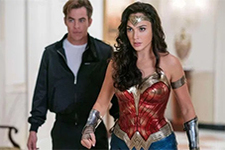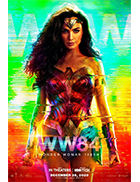Wonder Woman 1984
|  Wonder Woman 1984, Patty Jenkins’s gonzo-pop sequel to her 2017 superhero hit, has a go-for-broke approach that is admirable, if not always entirely successful. Everything that worked in the original film—the intense action, the big emotions, the unironic celebration of goodness and truth—are amplified here to proportions that border on bonkers, and the film’s greatest attribute may very well be that it doesn’t devolve into self-parody. The setting in the midst of the Reaganite ’80s, with its bright, gauche fashions and capitalism-on-steroids ethos, sets the tone both visually and thematically; Gordon Gekko’s infamous declaration in Oliver Stone’s Wall Street (1987) that “greed is good” forms the film’s moral backbone, with Wonder Woman battling not just a supervillain, but rather the collective desire to always have more, more, more, a vice the film itself flirts with at the risk of its own coherence. The screenplay, which was penned by Jenkins, Geoff Johns (a veteran of numerous DC television series, including The Flash), and Dave Callaham (Zombieland: Double Tap, The Expendable), opens with a flashback to Wonder Woman’s childhood, where she was a precocious Amazonian child named Diana competing against seasoned Amazonian warriors on her secret home island of Themyscira. The point of the opening sequence, beyond just providing some IMAX-worthy action right out of the gate, is to re-establish the fundamental place of truth and virtue in Diana’s world, as she learns an important lesson in not cheating to win, even if it seems justified in the moment. It is a lesson that is central to Diana’s worldview, which she carries with her in her role as Wonder Woman, who we first see swooping in to stop a jewelry store heist at a multi-level shopping mall. In the previous film, Wonder Woman had stopped nefarious evil during World War I, and she has clearly spent the ensuing decades lying low, working as an anthropologist at the Smithsonian, which is where she meets Barbara Minerva (Kristen Wiig), a new hire who is in every way her opposite: whereas Diana is elegant, strong, and self-assured, Barbara is mousy, neurotic, and insecure. That changes with the intervention of Maxwell Lord (Pedro Pascal), a TV-ready venture capitalist whose shady, infomercial-fueled oil-investing business is actually collapsing into a Ponzi-scheme abyss. Lord is after the Dreamstone, a seemingly worthless citrine stone that has the power to grant a wish to whoever holds it—although always with a catch. The Dreamstone is a plot device on par with a time machine, in that it holds massive power to upend reality, vastly change fortunes, and create infinite paradoxes, and it basically sends the second half of the film into complete chaos, as the world descends into wish-fueled anarchy (think nuclear weapons, people dropping dead, sudden fame, cities being divided). Diana is not immune from the allure of the Dreamstone, and she inadvertently wishes back to life Steve Trevor (Chris Pine), the American pilot with whom she fell in love in the first film and tragically lost in a suicide mission. His death was one of that film’s most affecting moments, and bringing him back is a stroke of melodramatic genius, as it allows he and Diana to continue their decades-long interrupted romance while setting up the possibility of even greater tragedy when Diana realizes that the cost of having him back is the loss of her powers and therefore the loss of her opportunity to serve a greater good. Barbara experiences the opposite, as she wishes to be like Diana, but in the process of becoming strong and self-assured, loses all sense of humanity, thus sending her on the downward path of glowering villainy. While Wiig plays up her familiarly awkward comic persona as Barbara pre-wish, she is impressively convincing post-wish, conveying in terms both unnerving and heartbreaking how sudden power goes to her head and warps her sensibilities, which further underscores what makes Wonder Woman’s balance of power and humanity so impressive and inspiring (Gadot, as she was in the first film, is remarkable in both the physicality she brings to Wonder Woman’s superheroism and the depth she brings to her very down-to-earth human emotions). And, just as Barbara is a tragic villain, so is Maxwell Lord, whose aspirations of grandiosity and refusal to ever be satisfied with his success provides a dark mirror to the American Dream, where the grass is always greener, there is always more money to be made, and no amount of power is ever enough. Lord, as it turns out, is literally willing to sacrifice the world in his quest for more, a blindness that is both literal and metaphorical. Jenkins, working again with cinematographer Matthew Jensen, elevates the film’s visuals to pure pop, with bright, primary colors and busy vistas dominating throughout. They get some good laughs at the expense of ’80s American culture (leg warmers, Miami Vice suits, and the like), and they keep the proceedings fairly light, so that even when the world is teetering toward calamity, it never feels overly weighty. They put together some bravura action scenes, two of the best being a desert chase through Egypt and a bout of fisticuffs in the halls of the White House, although the film’s most memorable moments are the ones that soar on pure emotion, particularly the one in which Wonder Woman, having been forced to make a terrible, agonizing choice, sprints throughs through the chaos around her and uses her lasso and heartbreak to literally fly. It is a moment that, on paper, simply shouldn’t work, but it does like gangbusters, reaching heights of operatic grandeur that the rest of the film can’t quite match. Copyright © 2020 James Kendrick Thoughts? E-mail James Kendrick All images copyright © Warner Bros. / DC |
Overall Rating: 

 (3)
(3)


